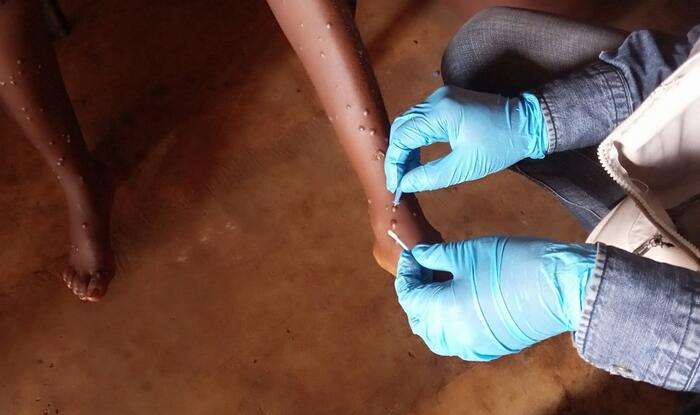In a significant move to combat the spread of mpox, the World Health Organization (WHO) announced on Friday, October 4 that it has approved the first-ever diagnostic test for the virus.
The disease, once known as monkeypox, is caused by a virus transmitted through infected animals or close human contact. Symptoms include fever, muscle aches, and large skin lesions resembling boils, which can become severe and potentially fatal.
With over 30,000 cases reported across Africa and more than 800 deaths attributed to mpox, the virus has become a serious public health concern, particularly in countries like the Democratic Republic of Congo (DRC).
Sixteen nations across the continent have reported infections, according to the African Union’s disease control center, and the spread continues to escalate.
Critical Tool for Expanding Diagnostic Capacity
The new test, developed by U.S. company Abbott Molecular, has been named the Alinity m MPXV assay. It enables faster detection of the mpox virus through swabs collected from skin lesions, delivering accurate results in less than two hours.
The WHO emphasized that the “approval for emergency use” of this test is pivotal in expanding diagnostic capacity, particularly in regions facing significant outbreaks.
As cases rise, timely and accurate detection of the virus is crucial to contain its spread. “Increasing access to quality-assured medical products is central to our efforts in assisting countries to contain the spread of the virus and protect their people, especially in underserved regions,” stated Yukiko Nakatani, assistant director-general at WHO.

The approval allows UN agencies to purchase and distribute the test to affected countries, with a primary focus on Africa, where mpox has taken its largest toll. The new diagnostic tool is expected to play a critical role in controlling the virus and mitigating its impact.
A Game-Changer in Virus Detection
The Alinity m MPXV assay offers continuous and random-access molecular analysis, according to Abbott Molecular. It allows health professionals to detect the presence of mpox DNA in pustular or vesicular rash samples, offering an efficient way to confirm suspected cases.
The spread of the virus continues to make headlines, with Ghana recently confirming its first case and reporting over 230 suspected infections. With the rapid implementation of this diagnostic test, health authorities hope to curtail the virus’s reach before it affects more regions.
WHO officials have stressed that the quicker people can be diagnosed, the faster containment measures can be rolled out. This includes contact tracing, quarantine, and, when necessary, treatment. In regions where healthcare systems are already strained, such measures will be vital in reducing the death toll and controlling the outbreak.
As mpox spreads through Africa and beyond, this newly approved diagnostic tool could be a game-changer. Its efficiency will help health workers track and contain the virus before it causes further devastation. For countries already overwhelmed by the virus, it represents a crucial step in the battle to protect vulnerable populations.
READ ALSO: Yvonne Chaka Chaka Arrives in Ghana For 2024 African Legends Night






















